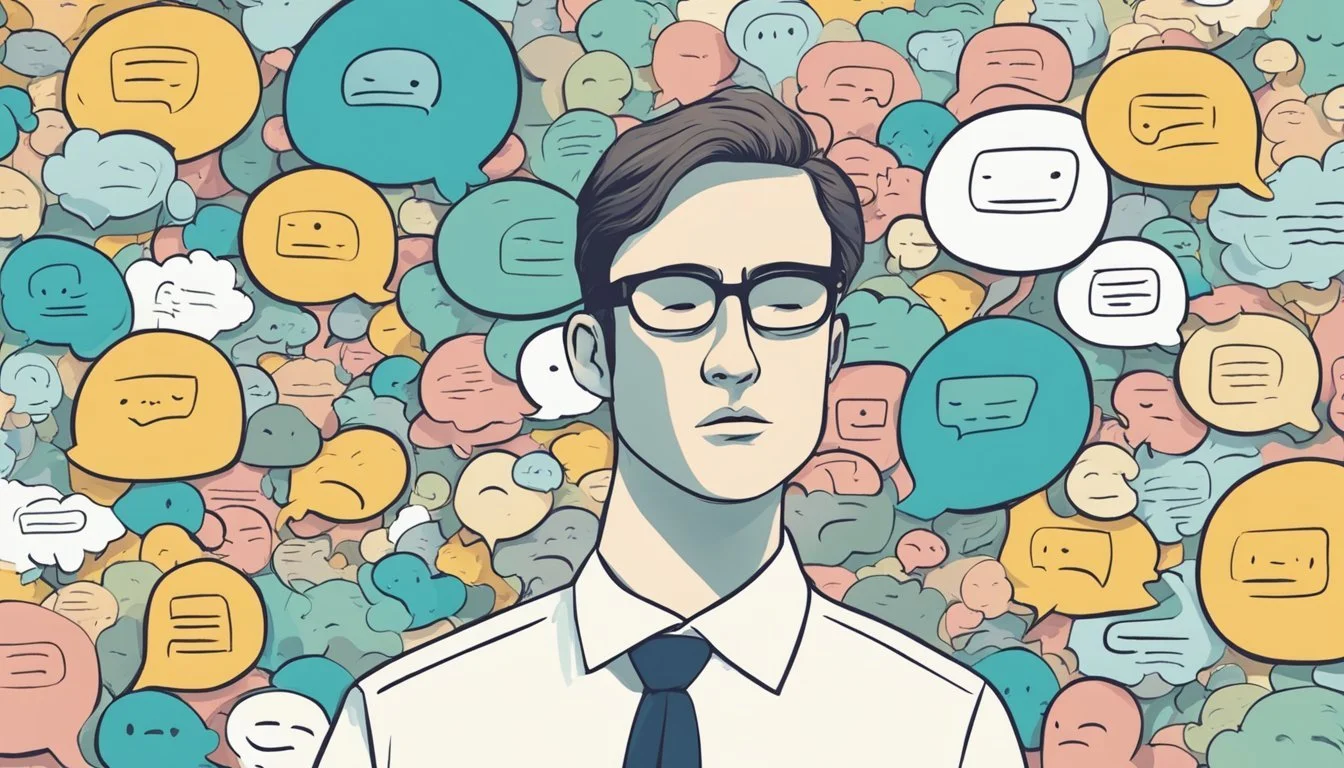11 Traits of People Who Always Play the Comparison Game
Key Indicators and Behaviors
People often find themselves trapped in the comparison game, a habit of evaluating their own lives in relation to others. This behavior can significantly impact their mental and emotional well-being. Understanding these traits can help identify the patterns that lead to constant comparison.
In this article, we will explore the common traits shared by people who frequently compare themselves to others. By recognizing these characteristics, readers can gain insights into the underlying reasons for their comparisons and learn how to address them.
1) Constantly Comparing
People who always play the comparison game frequently evaluate themselves against others. This behavior often manifests through social media usage, where individuals see curated versions of other people's lives.
They tend to feel inadequate when comparing their achievements to those of friends, colleagues, or even celebrities. This persistent habit can lead to feelings of envy and discontentment.
Such individuals might focus on aspects like wealth, physical appearance, or career success. They may place undue importance on these comparisons, affecting their self-esteem.
Research has indicated that the tendency to compare oneself can result in lower self-worth and increased depression.
Their attention is often diverted from their own goals and achievements, causing them to underestimate their progress. This focus on others' lives can make personal growth difficult.
Constant comparison can also lead to strained relationships, as these individuals might harbor feelings of jealousy or resentment toward those they compare themselves to regularly.
Engagement in this behavior might also correlate with higher levels of stress and anxiety, as it perpetuates a cycle of negative self-assessment and self-critique.
Recognizing the habit of constant comparison is the first step toward breaking free from it. Identifying triggers and implementing strategies to redirect focus can help in reducing its impact.
2) Low Self-Esteem
Low self-esteem can significantly impact a person's life, making them more likely to engage in the comparison game. Individuals with low self-esteem often feel inadequate and may constantly measure their worth against others. This behavior can exacerbate their difficulties and reinforce feelings of inferiority.
People with low self-esteem might exhibit signs such as passivity or even excessive generosity to gain approval. They may believe that others are always better or more capable, leading to frequent upward social comparison. These comparisons often result in a negative self-assessment rather than motivation.
The belief system associated with low self-esteem is typically rooted deeply in one's psyche. It shapes their habits, relationships, and sometimes entire lifestyles. This can make overcoming low self-esteem challenging, as it influences many areas of their life.
Low self-esteem does not always manifest as overt sadness or loneliness. Instead, it can be a hidden struggle, often masked by seemingly unrelated behaviors. For instance, a person may appear confident but internally feels inadequate.
For more information, learn about common disguises of people with low self-esteem and how upward social comparison can affect them. Recognizing these patterns can be the first step toward addressing and improving self-esteem.
3) Social Media Obsession
People who constantly compare themselves to others often show a strong obsession with social media. They are keenly aware of the latest trends and updates but can become overly focused on the approval of others through likes and comments.
This obsession blurs the lines between reality and the digital realm, making it easy for them to believe that online validation reflects their self-worth. Instead of finding balance, they get trapped in a cycle of seeking external affirmation.
This behavior leads to a continuous need to present a highly curated online persona. They might spend hours editing photos and crafting posts to fit their ideal image, losing touch with their true selves.
This fixation can have detrimental effects on mental health. Research indicates that heavy social media users often experience lower self-esteem and higher rates of depression, especially when they engage in constant comparisons.
In summary, this social media preoccupation is a key trait among those who habitually compare themselves to others. It underscores the importance of finding a balance between virtual interactions and real-life connections. Balancing these aspects can help alleviate the negative impacts of comparison and promote a healthier self-image.
For more insights on how social media fuels this comparison game, visit Lush to Blush.
4) Lack of Contentment
People who constantly compare themselves to others often struggle with a lack of contentment.
Their focus shifts to what others have, which can make them overlook or undervalue their own accomplishments and unique qualities.
A common consequence of this behavior is persistent dissatisfaction, where nothing seems good enough, regardless of their actual achievements.
This continual state of wanting more can create a loop of misery and self-doubt.
Theodore Roosevelt wisely noted that "Comparison is the thief of joy." By constantly comparing, individuals rob themselves of their own happiness and peace of mind.
Furthermore, rather than finding joy in their successes, they may feel envious or inadequate, always measuring their worth against others' perceived achievements.
People caught in this cycle may find it difficult to appreciate the present moments in their lives.
When one is not content with what they have, it becomes challenging to forge genuine connections or recognize the good around them.
This pervasive sense of lacking can hinder personal growth and well-being.
5) Seeking External Validation
People who frequently play the comparison game often seek external validation. This means they look for approval and praise from others to feel good about themselves.
They might measure their worth based on how others react to their achievements or failures. This constant need for validation can undermine their self-confidence.
Individuals in this pattern may struggle with societal pressures, feeling their value depends on others' opinions. They can become people-pleasers, putting aside their own needs.
This validation-seeking behavior is common and can result in negative emotions like anxiety, guilt, and confusion when validation is not received. It can also lead to a lack of self-awareness and personal growth.
Recognizing and addressing the tendency to seek external validation is crucial. Encouraging self-acceptance and focusing on personal values can help reduce this dependency on others.
Resources like Psychology Today and MagnifyMinds provide insights into overcoming validation-seeking behavior. Addressing these issues can help individuals build a healthier, more self-reliant sense of self.
6) Competitive Nature
Individuals who frequently engage in the comparison game often exhibit a highly competitive nature.
Competitiveness in this context can drive people to achieve their goals and outperform others. This can stem from a desire for validation, as success often brings social recognition and praise.
Many people with a competitive streak see life as a series of challenges to be overcome. They may continually measure their progress against peers and feel motivated by their standings.
Competitiveness can be heavily influenced by social factors. For example, social motivation can amplify a person's drive to succeed in the presence of potential rivals.
Some individuals are competitive because they seek to affirm their self-worth. They may believe that outperforming others is a necessity to prove their abilities and value.
Occasionally, competitiveness is a result of early experiences and upbringing. Those who were encouraged to excel in childhood often carry this mindset into adulthood. It's not uncommon for sibling rivalry to foster a lifelong drive to compete.
People who are naturally competitive may also thrive in environments that reward excellence. High-stakes careers, academic pursuits, and sports often attract those who find fulfillment in besting their competition.
7) Perfectionism
Perfectionism is a common trait among those who frequently engage in the comparison game. Individuals with perfectionist tendencies often impose extremely high standards on themselves. They may constantly measure their achievements against those of others.
Perfectionism significantly impacts mental health, often leading to increased anxiety and stress. This trait can result in negative self-talk and a persistent fear of failure.
People with perfectionist traits might struggle with productivity and relationships. The constant pressure to meet unattainable standards can cause issues in various aspects of life. Studies suggest that perfectionism is linked to social problems and physical health challenges due to ongoing stress.
There are different types of perfectionism. Socially prescribed perfectionism involves responding to perceived societal pressures. This can severely affect self-confidence and increase feelings of anxiety.
In contrast, other-oriented perfectionists have high expectations for others, which can create conflicts and strain relationships. Recognizing these traits is crucial for addressing the underlying issues related to the comparison game.
Efforts to overcome perfectionism often focus on setting realistic goals and being kinder to oneself. Small, manageable steps can reduce the fear of failure and build confidence over time. For more information on perfectionist traits, visit Verywell Mind.
8) Envy of Others
Envy often arises when individuals constantly compare themselves to others. It stems from a place of feeling inadequate or lacking in some way. This feeling of not measuring up can create a cycle where the person fixates on what others have that they do not.
Envy can manifest in various behaviors, such as feeling displeased when others succeed or achieve milestones. This is particularly evident when someone is congratulated or recognized for their accomplishments.
People who play the comparison game might experience discomfort in social settings, especially when highlighted in a group. This can intensify negative emotions and make them feel inferior at the slightest hint of another's success.
Envy can also drive people to try and undermine others, consciously or unconsciously. They may downplay the accomplishments of others or cast doubts on their abilities. It's a defense mechanism meant to elevate themselves by lowering others.
Recognizing and addressing envy is vital. It's important to focus on personal growth and achievements rather than fixating on what others might have. Making an effort to celebrate others' successes genuinely can help counteract the negative effects of envy. For more insights, explore these signs of envy.
9) Negative Self-Talk
People who constantly compare themselves to others often engage in negative self-talk. They focus on their perceived shortcomings and failures, reinforcing feelings of inadequacy. This cycle of self-criticism can be detrimental to mental well-being, often leading to lower self-esteem and increased anxiety.
Negative self-talk takes many forms, such as internalizing minor mistakes as major failures. Phrases like "I'm not good enough" or "I'll never succeed" become common. This internal dialogue shifts focus away from strengths and accomplishments, making it hard to appreciate personal progress.
Negative self-talk can also isolate individuals, causing them to withdraw from social interactions. They might avoid situations where they fear being judged or compared unfavorably to others. This reinforces a negative cycle, making it harder to break free from comparison habits.
Breaking free from negative self-talk requires mindfulness and effort. Techniques such as practicing self-compassion and replacing negative thoughts with positive affirmations can be effective. By consciously challenging and reframing these negative beliefs, individuals can start to change their inner dialogue and improve their self-esteem.
For additional information on the link between negative self-talk and self-esteem, visit Verywell Mind.
10) Fear of Missing Out
Fear of missing out, commonly known as FOMO, is a significant trait among people who frequently compare themselves to others. This feeling often stems from seeing others' activities on social media, leading to a perception that their own life is lacking.
Individuals with FOMO constantly check updates and posts. They often feel anxious if they are not part of social events or new experiences that others are enjoying. This compulsive behavior can lead to stress and dissatisfaction.
FOMO can significantly impact mental health, causing feelings of inadequacy and loneliness. Watching others' curated lives can create unrealistic expectations, further exacerbating the problem. This results in a vicious cycle of constant comparison and the need for validation.
Those affected by FOMO might also experience low self-esteem. Seeing peers having fun or achieving milestones can trigger envy, making them feel less successful or happy in their own lives. This comparison-based anxiety can take a serious toll on their well-being.
The constant pressure to keep up can lead people to overextend their social interactions or make impulsive decisions. They might attend events they have no genuine interest in just to avoid feeling left out, often at the expense of their own comfort and preferences.
Learn more about FOMO at Simply Psychology and Verywell Mind.
11) Unrealistic Standards
Unrealistic standards often arise from social media platforms that showcase curated versions of people's lives. These platforms present idealized images that may not accurately reflect reality. Exposure to these standards can lead individuals to compare themselves unfavorably with others.
This behavior can create feelings of inadequacy. Constantly seeing others' seemingly perfect lives tends to make people dissatisfied with their own. They may feel that they are not achieving enough or that their lives are lacking in some crucial way.
It also contributes to issues like depression and lower self-esteem. When people believe they need to match unrealistic standards, they set themselves up for failure. Failure to meet these standards often results in emotional distress and a negative self-view.
Understanding that social media often portrays an edited version of life is essential. These portrayals are not always accurate and can create false perceptions. Recognizing the difference between curated content and reality helps reduce the impact of these unrealistic comparisons.
Ultimately, breaking away from these comparisons can improve mental health. Focusing on personal growth rather than living up to idealized images is a healthier approach. It encourages individuals to set realistic goals based on their unique circumstances.
Psychological Reasons Behind Comparison
Individuals often engage in comparison due to deeper psychological motives. Key theories such as Social Identity Theory and the impact of self-esteem offer insights into why this behavior occurs.
Social Identity Theory
Social Identity Theory, proposed by Henri Tajfel, explains how a person's sense of who they are is based on their group membership. People categorize themselves and others into groups in an attempt to understand and find a place in the social world. This categorization leads to in-group favoritism and out-group discrimination.
The need to maintain or enhance self-esteem through group identification drives comparison. Individuals compare their group to other groups to maintain a positive social identity. This comparison can affect behavior, fostering competition or solidarity based on perceived group status.
People continuously assess whether their group stands favorably against others. This not only shapes interpersonal interactions but also influences societal dynamics.
Impact of Self-Esteem
Self-esteem levels play a critical role in why people engage in comparisons. Those with high self-esteem might compare themselves to others to reaffirm their positive self-view. Conversely, individuals with low self-esteem may constantly compare to seek validation or improve their self-assessment.
Frequent negative comparisons can further diminish self-esteem, leading to a vicious cycle of dissatisfaction. This phenomenon can be particularly acute when individuals feel inferior in domains like wealth, success, or attractiveness.
In an era dominated by social media, where curated content portrays idealized lives, the impact on self-esteem is profound. People find themselves battling feelings of inadequacy as they compare their own lives to seemingly perfect images online.
The Impact of Social Media and Digital Culture
Social media and digital culture significantly influence people's tendencies to compare themselves with others, shaping behaviors and emotions in profound ways. These effects are largely driven by the curated portrayal of life and the personalization of content.
Highlight Reel Effect
The Highlight Reel Effect occurs when users compare their everyday lives to the curated, often idealized, versions of others' lives they see online. Social media platforms allow individuals to showcase selected moments, achievements, and positive experiences.
This selective sharing can create a distorted view of reality. Users may feel pressured to meet perceived standards, leading to feelings of inadequacy and envy. Regular exposure to these highlight reels can distort self-perception and heighten dissatisfaction with one's own life and accomplishments.
Studies have shown that constant exposure to these idealized images fosters unrealistic expectations. It can be especially detrimental to self-esteem and mental health, particularly among younger users who are more susceptible to social comparison. Understanding the selective nature of social media content is crucial in mitigating its impact on self-esteem.
Algorithms and Exposure
Algorithms and Exposure play a critical role in influencing user behavior on social media. Platforms utilize complex algorithms to personalize content, displaying posts that are most likely to engage users. This can lead to a loop of constant comparison as the content reflects one's interests and interactions.
Personalized feeds often prioritize visually striking content, which can amplify the representation of success, beauty, and wealth. This targeted exposure can exacerbate feelings of inadequacy, as users are continually bombarded with images and posts that reinforce societal standards and ideals.
Recognizing how algorithms curate content is essential. By understanding the mechanics behind personalized feeds, users can take steps to control their exposure, potentially reducing the negative emotional impacts associated with social comparison.
Strategies to Stop Comparing Yourself to Others
To break free from the habit of comparing yourself to others, it is essential to develop self-compassion and set achievable personal goals. These two strategies can help redirect your focus and foster a healthier mindset.
Cultivating Self-Compassion
Self-compassion involves being kind to oneself in moments of failure or difficulty. Instead of harsh self-criticism, treat yourself with the same kindness you would offer a friend. Acknowledge that everyone has flaws and makes mistakes.
Practicing mindfulness helps in recognizing negative thoughts without judgment. Also, consider keeping a journal to note positive affirmations or achievements. Reflecting on your strengths and qualities can boost self-esteem and reduce the urge to compare negatively.
Structured routines like meditation can further enhance self-compassion. Techniques such as guided meditations focused on self-kindness can provide immediate psychological relief and foster a long-term compassionate mindset. Engaging in these practices regularly helps in maintaining a balanced and positive self-view.
Setting Personal Goals
Setting meaningful and realistic personal goals can shift your focus from others to yourself. Goals should align with your values and aspirations rather than being influenced by external standards.
Using the SMART framework (Specific, Measurable, Achievable, Relevant, Time-bound) can help in creating clear and attainable goals. For instance, instead of a vague goal like "get fitter," specify it as "run three times a week for 30 minutes."
Tracking progress is equally important. Utilize planners or digital tools to monitor small milestones. Celebrating these accomplishments fosters a sense of achievement and further motivates you to stay focused on your own path.
Engaging in activities that align with these goals can provide a sense of fulfillment. Whether it's a hobby or a professional pursuit, dedicating time to your passions can diminish the tendency to compare oneself to others and reinforce personal growth.







